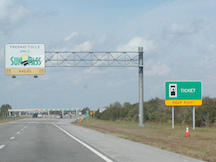
The way it works is that the transponder sends a signal to a sensing device that is located in the toll booth. The cost of the toll, which is often lower than if you were to pay in cash, is then deducted from a pre-paid account. These accounts are linked to your credit card and the amount of the toll is automatically charged. If you do not have an account already set up and you do not pay in cash, a picture is taken of your license plate and you will receive a toll notice in the mail. This system is referred to as the Toll-by-Plate program. When using this method, a notice of the billed amount is mailed to the registered owner of the vehicle. The amount billed includes an administrative fee that is added to the amount of the toll. If not paid by the due date, an additional amount is added to the cost of the toll ticket. If the toll is still not paid, you will be sent a toll traffic ticket which will result in a $100 fine. As with other types of traffic tickets, sometimes court costs, points on your license, and a possible driver’s license suspension may occur.
With 21 toll roads, the State of Florida has more of these roads than any other state and there are more to come. Although there are still some toll roads that accept cash, there are several others such as the Homestead Extension of Florida’s Turnpike and the Sawgrass Expressway that have converted to an open road tolling system. This open road tolling (ORT) is a system that eliminates traditional toll booths and toll booth attendants by implementing toll collection through this electronic method only. This process minimizes the congestion that tends to occur at toll booths by allowing cars to pass through the toll plazas at highway speeds. Devices installed at the toll plazas read the electronic information transmitted by the transponders. Additionally, these toll plazas have cameras installed that photograph license plates so that tolls can be assessed to drivers through the toll-by-plate system.
Now all of this may sound like progress, but there are some things to consider. As with most technology, this system is not flawless. If you commit a toll violation and have moved without updating your vehicle registration, there is no way to receive the toll violation notification by mail. Updating your registration is an easy thing to overlook when you are going through the stressful and time-consuming process of moving. Sometimes, not getting a toll violation notice is just a matter of human error such as the postal clerk placing the notification in the wrong mailbox. Not only are you still responsible for the toll fees, but also the traffic ticket and of all the associated penalties that go along with a traffic ticket.
Another issue that may arise is if there is a problem with your credit card. Whether it is a matter of your card expiring, identity theft, or exceeding your limit, if any transponder fees are denied, you will be held liable for the tolls and associated penalties even if you are completely unaware that there is a problem with the credit card.
If you realize after the fact that you have committed a toll violation, you can go online to pay to toll without incurring the additional charges. To avoid toll violations entirely, always make sure that your transponder is in good working order and that it is correctly registered to the car you are driving. Many people in South Florida use toll roads on a daily or weekly basis. If you are one of these people, it is especially important to make sure that your transponder is working properly, your credit card information is current, and your vehicle is correctly registered. Not doing so could result in hundreds and hundreds of dollars in fines before you are even aware that there is a problem.
The scope of the penalties that these errors could cost you is great. Keep in mind that the traffic ticket that you get for toll violations is a moving violation. The fines can add up quickly by not resolving the issue and can not only cost you money, but it also effects on your driving record.

FREE CONSULTATION
866-433-3363
Call now or contact us for a fast, free, no obligation consultation.

